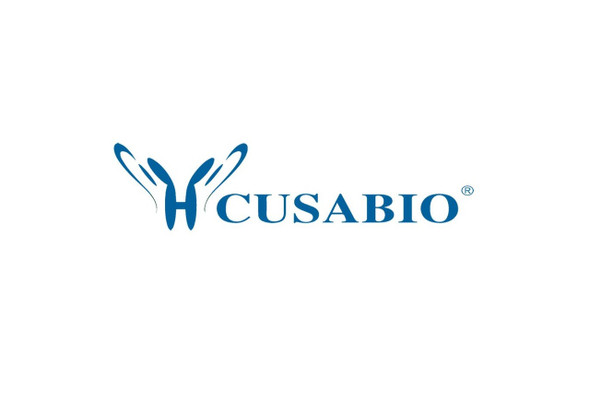Cusabio Human Recombinants
Recombinant Human Syncytin-1 (ERVW-1), partial | CSB-EP891578HU
- SKU:
- CSB-EP891578HU
- Availability:
- 3 - 7 Working Days
Description
Recombinant Human Syncytin-1 (ERVW-1), partial | CSB-EP891578HU | Cusabio
Alternative Name(s): Endogenous retrovirus group W member 1 Env-W Envelope polyprotein gPr73 Enverin HERV-7q Envelope protein HERV-W envelope protein HERV-W_7q21.2 provirus ancestral Env polyprotein Syncytin Cleaved into the following 2 chains: Surface protein Short name: SU Alternative name(s): gp50 Transmembrane protein Short name: TM Alternative name(s): gp24
Gene Names: ERVW-1
Research Areas: Cell Biology
Organism: Homo sapiens (Human)
AA Sequence: APPPCRCMTSSSPYQEFLWRMQRPGNIDAPSYRSLSKGTPTFTAHTHMPRNCYHSATLCMHANTHYWTGKMINPSCPGGLGVTVCWTYFTQTGMSDGGGVQDQAREKHVKEVISQLTRVHGTSSPYKGLDLSKLHETLRTHTRLVSLFNTTLTGLHEVSAQNPTNCWICLPLNFRPYVSIPVPEQWNNFSTEINTTSVLVGPLVSNLEITHTSNLTCVKFSNTTYTTNSQCIRWVTPPTQIVCLPSGIFFVCGTSAYRCLNGSSESMCFLSFLVPPMTIYTEQDLYSYVISKPRNKRVPILPFVIGAGVLGALGTGIGGITTSTQFYYKLSQELNGDMERVADSLVTLQDQLNSLAAVVLQNRRALDLLTAERGGTCLFLGEECCYYVNQSGIVTEKVKEIRDRIQRRAEELRNTGPWGLLSQ
Source: E.coli
Tag Info: N-terminal 6xHis-SUMO-tagged
Expression Region: 21-443aa
Sequence Info: Extracellular Domain
MW: 63 kDa
Purity: Greater than 90% as determined by SDS-PAGE.
Relevance: This endogenous retroviral envelope protein has retained its original fusogenic properties and participates in trophoblast fusion and the formation of a syncytium during placenta morphogenesis. May induce fusion through binding of SLC1A4 and SLC1A5 (PubMed:10708449, PubMed:12050356, PubMed:23492904).Endogenous envelope proteins may have kept, lost or modified their original function during evolution. Retroviral envelope proteins mediate receptor recognition and membrane fusion during early infection. The surface protein (SU) mediates receptor recognition, while the transmembrane protein (TM) acts as a class I viral fusion protein. The protein may have at least 3 conformational states: pre-fusion native state, pre-hairpin intermediate state, and post-fusion hairpin state. During viral and target cell membrane fusion, the coiled coil regions (heptad repeats) assume a trimer-of-hairpins structure, positioning the fusion peptide in close proximity to the C-terminal region of the ectodomain. The formation of this structure appears to drive apposition and subsequent fusion of membranes.
Reference: "Molecular characterization and placental expression of HERV-W, a new human endogenous retrovirus family."Blond J.-L., Beseme F., Duret L., Bouton O., Bedin F., Perron H., Mandrand B., Mallet F.J. Virol. 73:1175-1185(1999)
Storage: The shelf life is related to many factors, storage state, buffer ingredients, storage temperature and the stability of the protein itself. Generally, the shelf life of liquid form is 6 months at -20?/-80?. The shelf life of lyophilized form is 12 months at -20?/-80?.
Notes: Repeated freezing and thawing is not recommended. Store working aliquots at 4? for up to one week.
Function: This endogenous retroviral envelope protein has retained its original fusogenic properties and participates in trophoblast fusion and the formation of a syncytium during placenta morphogenesis. May induce fusion through binding of SLC1A4 and SLC1A5
Involvement in disease:
Subcellular Location: Surface protein: Cell membrane, Peripheral membrane protein
Protein Families: Gamma type-C retroviral envelope protein family, HERV class-I W env subfamily
Tissue Specificity: Expressed at higher level in placental syncytiotrophoblast. Expressed at intermediate level in testis. Seems also to be found at low level in adrenal tissue, bone marrow, breast, colon, kidney, ovary, prostate, skin, spleen, thymus, thyroid, brain and trachea. Both mRNA and protein levels are significantly increased in the brain of individuals with multiple sclerosis, particularly in astrocytes and microglia.
Paythway:
Form: Liquid or Lyophilized powder
Buffer: If the delivery form is liquid, the default storage buffer is Tris/PBS-based buffer, 5%-50% glycerol. If the delivery form is lyophilized powder, the buffer before lyophilization is Tris/PBS-based buffer, 6% Trehalose, pH 8.0.
Reconstitution: We recommend that this vial be briefly centrifuged prior to opening to bring the contents to the bottom. Please reconstitute protein in deionized sterile water to a concentration of 0.1-1.0 mg/mL.We recommend to add 5-50% of glycerol (final concentration) and aliquot for long-term storage at -20?/-80?. Our default final concentration of glycerol is 50%. Customers could use it as reference.
Uniprot ID: Q9UQF0
HGNC Database Link: HGNC
UniGene Database Link: N/A
KEGG Database Link: KEGG
STRING Database Link: STRING
OMIM Database Link: OMIM









